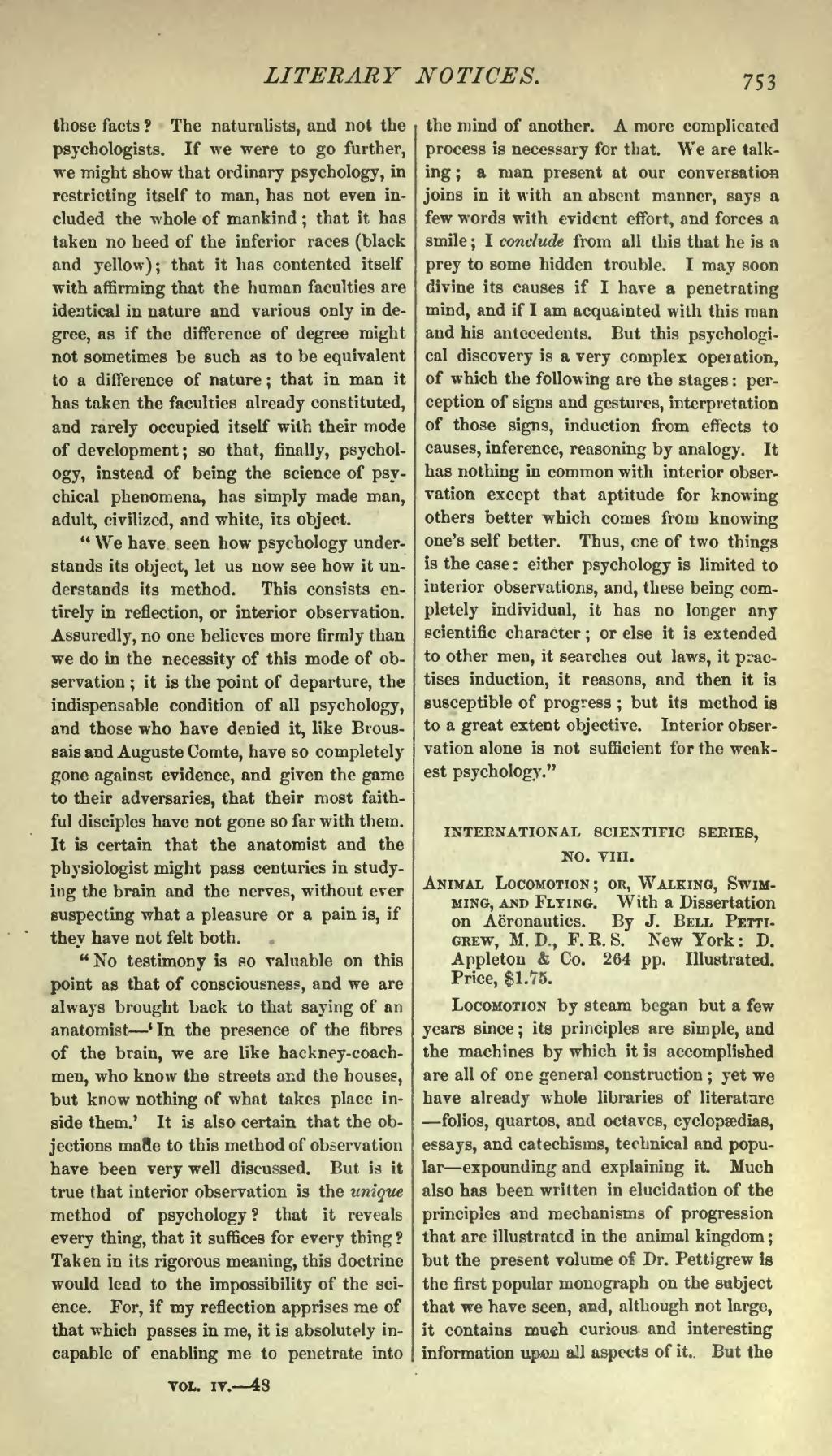those facts? The naturalists, and not the psychologists. If we were to go further, we might show that ordinary psychology, in restricting itself to man, has not even included the whole of mankind; that it has taken no heed of the inferior races (black and yellow); that it has contented itself with affirming that the human faculties are identical in nature and various only in degree, as if the difference of degree might not sometimes be such as to be equivalent to a difference of nature; that in man it has taken the faculties already constituted, and rarely occupied itself with their mode of development; so that, finally, psychology, instead of being the science of psychical phenomena, has simply made man, adult, civilized, and white, its object.
"We have seen how psychology understands its object, let us now see how it understands its method. This consists entirely in reflection, or interior observation. Assuredly, no one believes more firmly than we do in the necessity of this mode of observation; it is the point of departure, the indispensable condition of all psychology, and those who have denied it, like Broussais and Auguste Comte, have so completely gone against evidence, and given the game to their adversaries, that their most faithful disciples have not gone so far with them. It is certain that the anatomist and the physiologist might pass centuries in studying the brain and the nerves, without ever suspecting what a pleasure or a pain is, if they have not felt both.
"No testimony is so valuable on this point as that of consciousness, and we are always brought back to that saying of an anatomist—'In the presence of the fibres of the brain, we are like hackney-coachmen, who know the streets and the houses, but know nothing of what takes place inside them.' It is also certain that the objections made to this method of observation have been very well discussed. But is it true that interior observation is the unique method of psychology? that it reveals every thing, that it suffices for every thing? Taken in its rigorous meaning, this doctrine would lead to the impossibility of the science. For, if my reflection apprises me of that which passes in me, it is absolutely incapable of enabling me to penetrate into the mind of another. A more complicated process is necessary for that. We are talking; a man present at our conversation joins in it with an absent manner, says a few words with evident effort, and forces a smile; I conclude from all this that he is a prey to some hidden trouble. I may soon divine its causes if I have a penetrating mind, and if I am acquainted with this man and his antecedents. But this psychological discovery is a very complex operation, of which the following are the stages: perception of signs and gestures, interpretation of those signs, induction from effects to causes, inference, reasoning by analogy. It has nothing in common with interior observation except that aptitude for knowing others better which comes from knowing one's self better. Thus, one of two things is the case: either psychology is limited to interior observations, and, these being completely individual, it has no longer any scientific character; or else it is extended to other men, it searches out laws, it practises induction, it reasons, and then it is susceptible of progress; but its method is to a great extent objective. Interior observation alone is not sufficient for the weakest psychology."
INTERNATIONAL SCIENTIFIC SERIES, NO. VIII.
Animal Locomotion; or, Walking, Swimming, and Flying. With a Dissertation on Aëronautics. By J. Bell Pettigrew, M. D., F. R. S. New York: D. Appleton & Co. 264 pp. Illustrated. Price, $1.75.
Locomotion by steam began but a few years since; its principles are simple, and the machines by which it is accomplished are all of one general construction; yet we have already whole libraries of literature—folios, quartos, and octaves, cyclopædias, essays, and catechisms, technical and popular—expounding and explaining it. Much also has been written in elucidation of the principles and mechanisms of progression that are illustrated in the animal kingdom; but the present volume of Dr. Pettigrew is the first popular monograph on the subject that we have seen, and, although not large, it contains much curious and interesting information upon all aspects of it. But the

